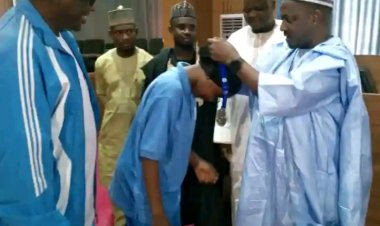Human Trafficking Get 'Red Card' In Drama Sketch At DELSU
A short drama sketch played out at the office of the Vice-Chancellor of Delta State University, Abraka (DELSU), Professor Andy Egwunyenga on Thursday, January 18, 2024 in which he was the star actor.

A short drama sketch played out at the office of the Vice-Chancellor of Delta State University, Abraka (DELSU), Professor Andy Egwunyenga on Thursday, January 18, 2024 in which he was the star actor, Myschoolnews gathered.
Read also: DELSU VC, Professor Egwunyenga, Underscores Importance of Students, Pledges Close Attention
Every person in the office showed a ‘red card’ against imaginary perpetrators of human trafficking in Nigeria during a courtesy call to the Vice-Chancellor.

The director of the drama clip was a senior officer of the National Agency for the Prohibition of Trafficking in Persons (NAPTIP) Commander, Benin Zonal Command, Mr. Nduka Nwanwene, who ensured that the ‘characters’ in the drama showed their ‘red card’ to pursue all those whose stock-in- trade was trafficking persons, engaging in organ harvesting, with a view to making illegal money through such high criminality. The ‘red card’ has a message-stop human trafficking!.

On it flip side are actions considered crime such as employing a child under 12 as a domestic worker, employing a child under 18 to do any work that is exploitative, injurious or hazardous to the development of the child. Others are: dealing with any person as a slave, removing, buying or selling human organs as well as organizing human travels which promote sexual exploitation. The pamphlet warns of serious punishment for any of the identified crimes.
Read also: DELSU SUG Warns Students on Payment of Fees Through Cafe
The NAPTIP team led by Barrister Nwanwene commended the University management for its wonderful performance but regretted the growing incident of human trafficking and allied crimes which he described as “ill wind that blows nobody any good”. He explained that emerging trend tended to suggest that traffickers preferred young persons to satisfy the growing need for organs in certain countries. Barrister Nwanwene noted that many young persons in Nigeria were deceived into engaging in irregular migration with dire consequences, especially by falling prey to organ harvesting.

Apart from the NAPTIP team, the Economic and Financial Crime Commission (EFCC) also came along simultaneously. The leader of the delegation, Mr. Chika Uneke, Head, Foreign Exchange Malpractices Section, EFCC, Benin City, outlined the mandate of the commission to include prevention, investigation and prosecution of financial crimes.

He, however, noted that the organization was laying emphasis on prevention, especially among the young population whom they interacted with during the orientation of fresh students of the University. He assured that the anti-corruption agency would inaugurate integrity clubs in the University to give students the opportunity to understand the dangers of corruption and how it would affect their future.

Welcoming the two groups, Professor Egwunyenga informed them that it was the University tradition to organize an orientation programme for its fresh students to integrate them into the academic community. He commended them for their advocacy which would help the young students appreciate the enormity of the problems under consideration but condemned the spate of irregular migrations which had destroyed many lives, describing it as second slavery in which Africans turned in themselves, unlike the first slavery where they were forced into it.
Read also: DELSU VC, Professor Egwunyenga, Advocates A Multilateral Approach In Fighting Illegal Drugs
The Vice-Chancellor promised to collaborate with the NAPTIP and EFCC in a sustained engagement that would produce desired results, urging them to make more sacrifices for the cooperation to succeed. He expressed sadness at the negative use of the power of the internet, by certain persons. “They are bringing crime and superstition to the table”, he regretted.





